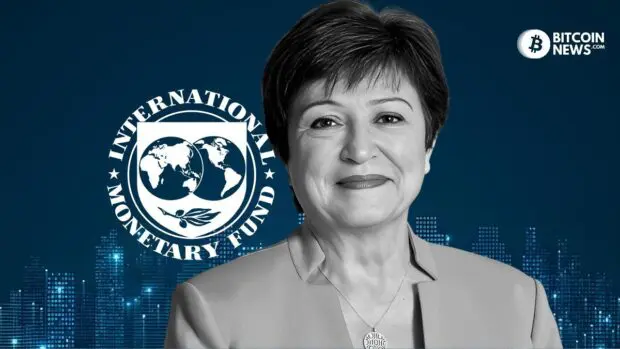Digital assets have been a hot topic globally, drawing attention from financial experts and policymakers alike. Recently, Kristalina Georgieva, the Managing Director of the International Monetary Fund (IMF), highlighted the pressing need for comprehensive regulations to manage the “risks” associated with the digital assets.
She stated:
“[…] crypto assets are not going away. Bitcoin is trading at its highest value since April 2022. The crypto market cap doubled over the last year. And still today people search for the word “Bitcoin” about 20 times more than “health and wellness,” and 7 times more than “climate change,””
Kristalina Georgieva: “Digital Assets Pose Financial Risks”
Georgieva, in a series of discussions and conferences, emphasized the potential risks posed by the increasing adoption of digital assets. She pointed out that digital assets “are here to stay,” and their widespread use could potentially undermine the stability of financial systems worldwide.
Related reading: Hillary Clinton Thinks Bitcoin Could Undermine The Role Of The Dollar And Destabilize The Country
In her addresses, Georgieva highlighted various concerns. One of her major worries was the impact of high digital asset adoption on macro-financial stability. She pointed out that such adoption might affect monetary policy transmission, capital flow management, and fiscal sustainability due to uncertain tax collection methods associated with digital assets.
She highlighted:
“The challenge is that high crypto asset adoption could undermine macro-financial stability […] Also, crypto asset adoption is high, especially in emerging market economies like India, Nigeria, and Vietnam.”
Call for Regulations and Infrastructure
IMF Chief stressed the importance of implementing clear rules and establishing necessary infrastructure to mitigate these risks effectively. She emphasized the need for precise tax regulations and a solid legal framework to address concerns like anti-money laundering and financing terrorism, stating that countries are taking steps towards this goal.
Related reading: Bitcoin Could Free Us From KYC AML Processes
She added:
“Countries are implementing this guidance—turning it into legislation, training supervisors and overseers, and enforcing compliance. Korea, for instance, is showing leadership by amending its anti-money laundering law and setting up new legislation on crypto assets […] Our goal is to make a more efficient, interoperable and accessible financial system by providing rules to avoid the risks of crypto, and infrastructure by leveraging some of its technologies.”
She also stated that she believes good rules can “spur and guide innovation.”
IMF’s Different Approach
The IMF’s approach to digital assets regulation differs from that of certain national regulators. Unlike some entities focusing solely on specific aspects, the IMF emphasizes a comprehensive, coordinated, and consistent policy approach to manage the so called risks. This approach is built on three core pillars: a robust macro-policy foundation, precise legal treatment, and detailed, practical implementation.
In a press release, the IMF emphasized the increasing importance of establishing effective policies for digital assets as a crucial priority for authorities. It also stated that this urgency arises from the failures of various digital asset exchanges and other entities within the ecosystem, along with the collapse of certain digital assets.
The statement stresses that inaction is not a viable option, given that digital assets may persist and evolve despite the current downturn in the market.
Looking Ahead
In conclusion, while International Monetary Fund shows concerns about the risks associated with digital assets. It also admits that these assets are here to stay, with growing market value and public interest.
The IMF calls for comprehensive regulations, legal clarity and infrastructure, announcing a need to balance innovation and risk management. Its approach emphasizes coordinated policies and proactive measures, setting a precedent for a holistic regulatory strategy.
As countries move towards legislation and enforcement, the IMF’s commitment to fostering an efficient and accessible financial system reflects a restrictive approach towards digital assets. In addressing the challenges posed by digital assets, the IMF aims to embrace their potential while ensuring a well-regulated and resilient financial future.










